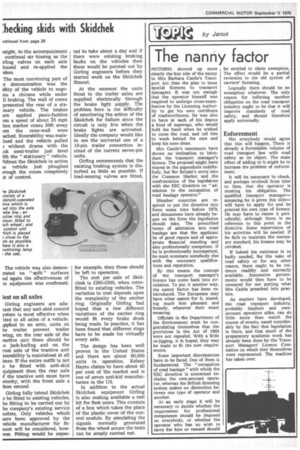The nanny factor
Page 32

If you've noticed an error in this article please click here to report it so we can fix it.
NOTHING Showed up more clearly the key -role of the nanny in Mrs Barbara Castle's Transport Act than the plan to issue special licences Ito transport managers. It was not enough that the operator 'himself was required to undergo cross-examination by the Licensing Authority to get his own certificate of roadworthiness. He was also to have at each of his depots a kind of superego, who would hold his hand When he wished to cross 'the road, and tell him to wash behind the ears and keep his nose clean Mrs Cadtle's successors have shown no inclination to introduce the transport manager's licence. The proposal might have stayed in the pigeonhole indefinitely, but for Britain's entry into the Common Market and the confrontation Of the legislators with the BBC directive on "admission to the occupation of road haulage operator."
Member countries are required to put the directive into -force some time before 1978, and discussions have already begun on the form the legislation should take. The prescribed terms of admission into road haulage are that the applicant be of good repute and of appropriate financial standing and also professionally competent. If he is professionally incompetent, he must nominate somebody else with the necessary qualifications and reputation.
By this means the concept Of the transport manager's licence has come back Into circulation. To put it another way, the nanny factor has been reintroduced. The Europeans may have other names for it, sounding much less pleasant and homely, whatever their exact meaning.
Officials in the Department of the Environment must be congratulating themselves that the provisions in the Act otf 1968 were not repealed. With a little re-jigging, it is hoped, they may be made to fit the new requirements.
Some important discrepancies have to be faced. One of them is fundamental. The "occupation of road haulage" with which the EEC directive is concerned exdudes the awn-account operator, Whereas the British licensing system makes no distinction between one type of operator and another.
At an early stage it will be necessary to decide whether the requirement for professional competence should be imposed on everybody, or whetherthe operator who has no wish to carry for hire or reward should be entitled to claim exemption. The effect would be a partial reversion to the old system of carriers' licensing.
Logically there should be TM exemption whatever. The only reason for inflicting another obligation on the road transport industry ought to be that it will improve standards of road safety, and should therefore' apply universally.
Enforcement
Not every-body would agree that this will happen, There is already a formidable volume of road transport law with road safety as its object. The main effect Of adding to it might be to increase the problem of enforcement.
It will be necessary to check, and perhaps re-check from time to time, that the operator is meeting his obligation. The qualified transport manager— assuming he is given this title— will have Ito apply for and be granted his own type Of licence. He may have to renew it periodically, 'although there is no reference to this point in the directive. Some 'supervision of his activities will be needed. If he tails to maintain the necessary standard, his licence may be revoked.
If Indeed 'his existence is so badly needed, for the sake of road safety or for any other reason, there ought to be evidence readilly and currently available. Successive governments would then have to be censured for not putting what Mrs Castle preached into practice.
As matters have developed, the road transport industry, probably hauliers and ownaccount operators alike, can do little more than watch the course of events, eased considerably by the Tact that legislation Is there, and that much of the preparatory academic work has already been done by the Transport Managers' Licence Committee on which they themselves were represented. The machine has taken over.
























































































































